Bituminous Roadways Inc. Celebrates 75 Years in Business
BY AsphaltPro Staff
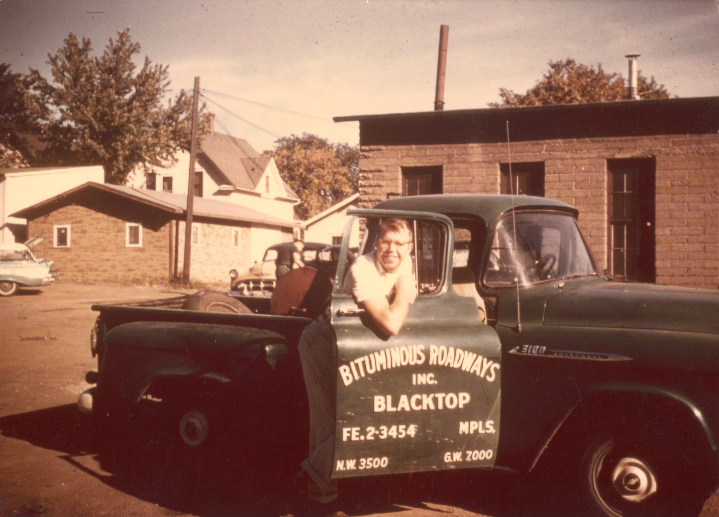
In 1946, Al Wendell and two co-workers at an asphalt roofing company decided to open an asphalt paving business. Wendell went on vacation, and when he returned, he discovered his former co-workers had started a business on their own. Wendell was out.
Instead of returning to the roofing company, Wendell went out on his own, establishing his residential paving operations in south Minneapolis. Wendell expanded his crew as the company grew, and in 1958, Palmer Peterson applied for a position as a part-time estimator. He was studying civil engineering at the University of Minnesota when he spotted the help wanted ad in the university newspaper.
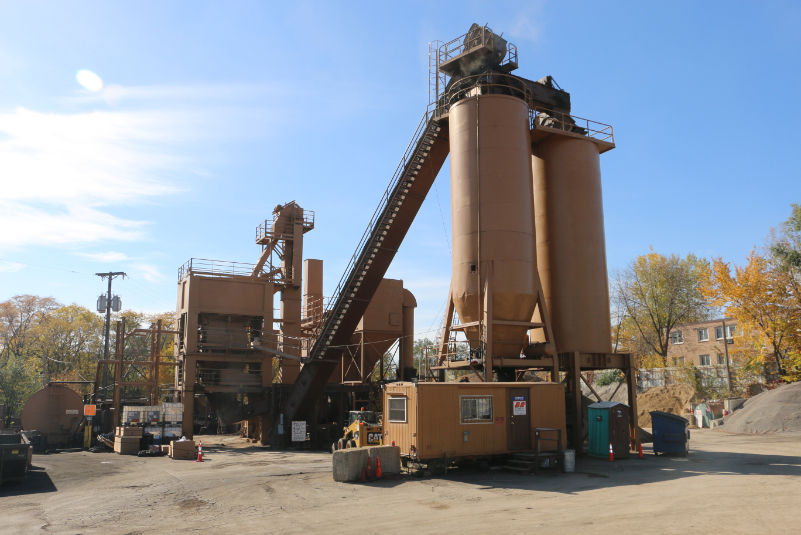
BR is celebrating 75 years in business in 2021. Its Minneapolis plant, pictured, was the company’s first asphalt plant.
“At the time, he had one year left to finish his degree, but once he started working with [Wendell], the two got along so well that he decided to stay on full time,” said Kent Peterson, Palmer Peterson’s son and Bituminous Roadways’ current president and CEO. Over the years, the pair developed a close friendship. Palmer Peterson, whose parents were divorced, only saw his father during the summers; Wendell became like a father to him. “They worked hard to build the business together.”
Then, in 1968, after a day of fishing with Palmer and Kent Peterson, Wendell died of a heart attack. Palmer Peterson had already started buying into the company. After Wendell’s death, he bought out Wendell’s wife, Lorene, and continued Wendell’s legacy. Wendell had competed with the company launched by his former co-workers for 20 years. After another 30 years of effort under Peterson’s leadership, BR was still going strong while the other company went out of business. Now, in 2021, BR is celebrating 75 years in business.
Growing Operations
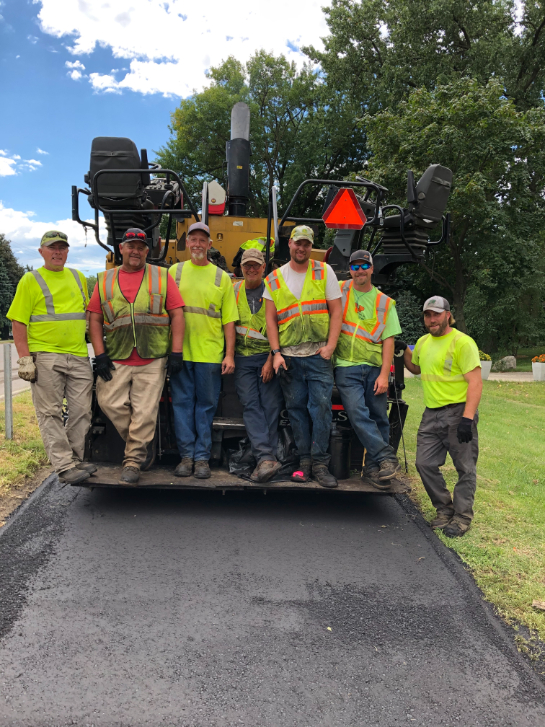
Bituminous Roadways Inc., has six paving crews, eleven grading crews, three maintenance crews, one concrete crew and two milling crews.
In 1980, Bituminous Roadways bought its second asphalt plant in Inver Grove Heights, south of St. Paul. They replaced the plant with a new, higher-production plant in 1996. In 2000, they started a third plant in Shakopee, southwest of the Twin Cities metro area. In 2018, they set up a fourth plant in Columbus, north of the Twin Cities metro area. And, they’re on their third plant at the original asphalt plant site in south Minneapolis.
Bituminous Roadways also mines its own aggregates at its gravel pit in Inver Grove Heights, in addition to buying from outside sources.
Prior to the addition of its Columbus plant, Bituminous Roadways could have performed work on the north side of town, but it would have made for a long haul. “That makes it harder to do larger jobs in that area,” Peterson said. “The Columbus plant improves our efficiencies to serve customers in the north metro area.”

Roughly 95 percent of Bituminous Roadways’ asphalt goes to its own projects, which range from roadways and highways to parking lots, trails and pathways, outdoor athletic surfaces, and more.
“With the locations of our plants, we can serve the entire Minneapolis/St. Paul metro area,” Peterson said. Roughly 95 percent of Bituminous Roadways’ asphalt goes to its own projects, which range from roadways and highways to parking lots, trails and pathways, outdoor athletic surfaces, and more.
“The only thing we don’t do is residential driveways,” Peterson said. And he means it. The company will perform small $500 patch jobs one day and a multi-million-dollar highway project the next. “My father’s strategy was if we take care of our customers on smaller work—and we do a good job—they will call us back to do all of their work.”
“It’s sort of like if you go to a dentist to fill a cavity and he tells you he only does bridge work,” he said. “You go find a dentist to fill your cavity and when you need bridge work done, you go to the dentist who took care of you before.”
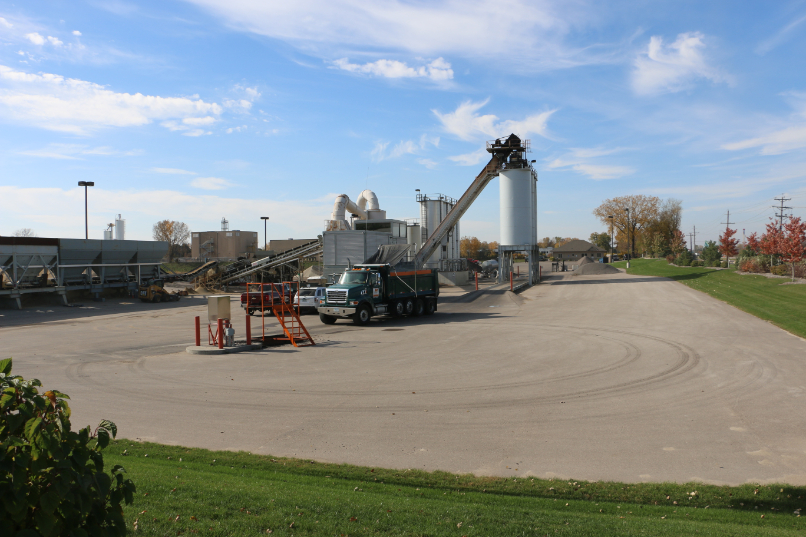
In 2000, BR started a third plant in Shakopee, southwest of the Twin Cities metro area.
This approach results in an average of around 800 projects per year. The company also strives to perform close to a 50-50 balance of public and private work.
“We need larger work to keep operating efficiently, keep our plants producing and our unit costs down, so we need a certain amount of high production work,” Peterson said. That’s where public jobs come in. Meanwhile, private jobs offer better margins, due to the way Bituminous Roadways manages those jobs. “If we can get a good mix of high production and higher margin work, we’re better off.”
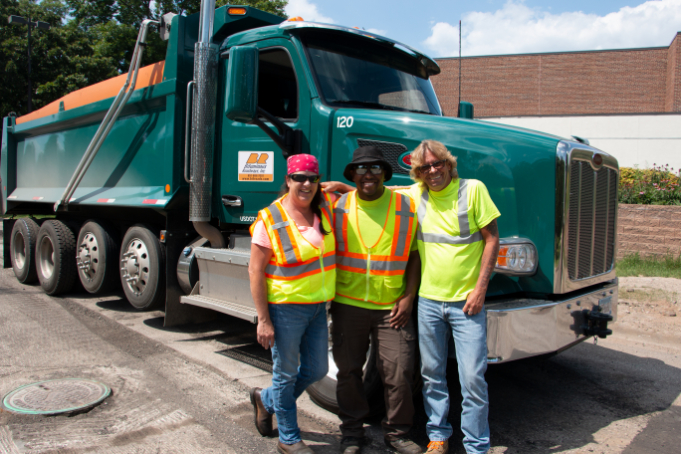
Pictured: BR truck drivers Kate Hackel, Jeff Milles and Todd Henriksen
This has enabled the company to work on a wide variety of unique and high-profile projects around the Twin Cities, including the Minnesota Vikings’ new training facility, the Canterbury Park race track in Shakopee, Target Field and TCF Stadium, the Omni Hotel, Topgolf, and almost all the Target stores in the state. They also perform high-profile highway projects, such as 169/41 in Shakopee and I-35W just north of Minneapolis.
Today, the company has 220 employees during the paving season, including six paving crews, eleven grading crews, three maintenance crews, one concrete crew and two milling crews.
People, People, People
Peterson credits Bituminous Roadways’ success to its employees. “We can buy the best equipment, materials and plants, but what makes the company work is the people,” he said. “If you hire the right people for your organization, treat them well, help them take care of their family with a good income and good health insurance, and you keep them safe, that’s the key.”
To facilitate a family feel within the organization, the company often holds company parties and picnics, recognizes birthdays and other important life milestones, and makes a point to buy its crews lunch regularly. And working there is, for some, an actual family affair. “We have one couple, both of whom are longtime employees, and a number of second generation workers whose parents also worked here,” Peterson said. One second generation worker, Brad Nelson, has been at the company for 42 years; his father started working for the company in 1966.

In 1980, Bituminous Roadways bought its second asphalt plant in Inver Grove Heights, south of St. Paul.
Because people are the key to the company’s success, Bituminous Roadways puts a lot of effort into finding the right staff each season.
“Anytime your work is seasonal, you tend to have a decent amount of turnover,” Peterson said. Last year, they hired 70 people for the paving season. “And when you’re growing, you need that many more people.”
Throughout the years, the company has run recruitment ads on billboards and on the radio. Recently they’ve been running social media and search ads, to which they’ve received a good response. BR strives to be mindful of what positions are best marketed on which platform. For example, they use LinkedIn to find estimators, superintendents and similar roles, whereas they’ve had more luck finding laborers through Facebook.
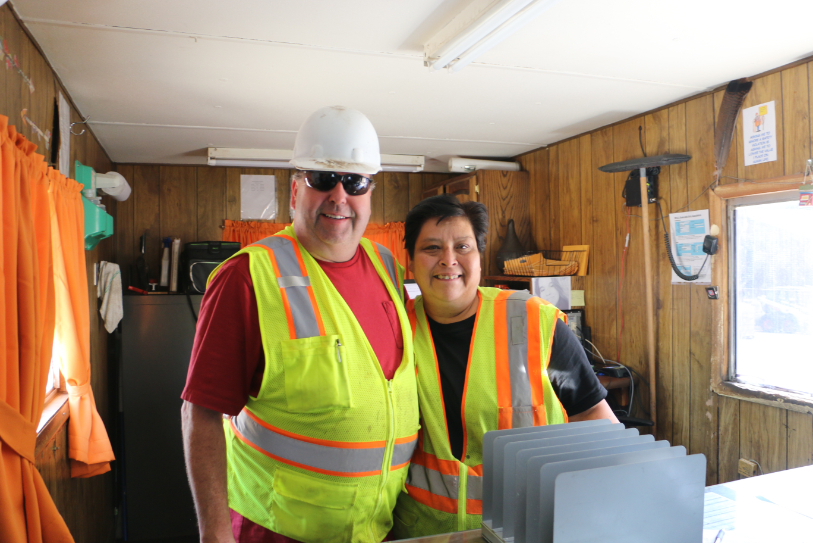
Brad Nelson and Tammy Hoyle are two of BR’s Minneapolis plant team members. Nelson has been with BR for 42 years.
Bituminous Roadways also prioritizes hiring from within. For example, the company just recently promoted its operations manager, Randy Kramer, to the role of vice president. He started with the company as a field supervisor in 1993. The person who filled the role of operations manager, Koby Fechner, started as an equipment operator in 1997 before working his way up.
Part of Peterson’s desire to grow the company is to offer opportunities to people who are committed to the company. “We need to grow as a company so we can offer them additional opportunities.”
Part of that future growth, he hopes, includes his own four children. Peterson, who worked at Bituminous Roadways during summers throughout high school and college, considers himself Bituminous Roadways’ third generation. He was promoted to president in 1996 and has run the company ever since.
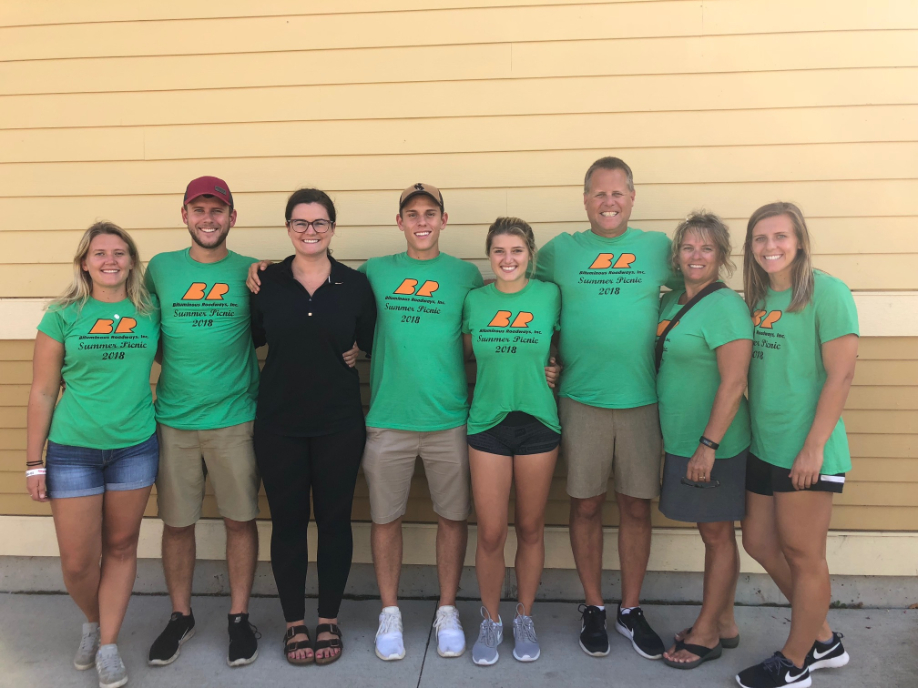
Kent Peterson, Bituminous Roadways’ current president and CEO, considers himself the company’s third generation. Pictured third from the right next to his wife, Paula, Peterson hopes his children (pictured, along with their significant others) will lead the company’s fourth generation.
Although the technology, equipment and production rates have changed dramatically since Peterson joined the industry in 1982, perhaps the starkest change in his opinion relates to safety. When he started, safety was pretty lax: “PPE was optional, safety vests weren’t required, people came to work in shorts and worked shirtless,” he said. “Safety has also become a much higher priority across our industry.”
“My vision for the company is that it continues on in the family and moves onto the fourth generation,” he said. He hopes to see the fourth generation help steer the company into the future. “The younger generation has a better grasp on the latest technology to make the business more efficient and provide even better quality.”
Already, the company has invested in intelligent compaction, thermal profiling and other technologies. They even built their own trucking app perfectly suited to their needs. “We didn’t find one that fit us perfectly, so we developed our own,” Peterson said.
The fourth generation of the company could take things to the next level, he believes.
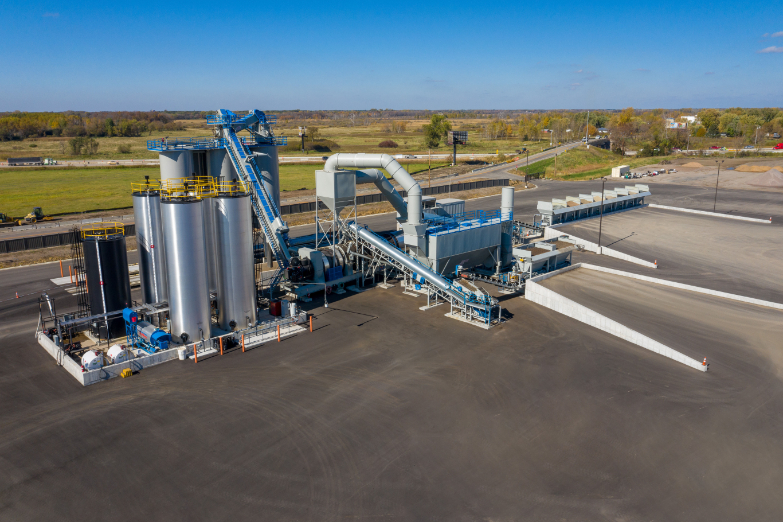
Bituminous Roadways Inc., established its plant in Columbus, Minnesota, in 2018.
His oldest son, Jack, holds a civil engineering degree from the University of Wisconsin and has worked for the company full time for four years. His other son, Eric, is studying civil engineering at the University of St. Thomas and has expressed interest in working in the family business. His daughter, Emily, works for a large public accounting firm now, “but I’m trying to convince her to come on board.” His other daughter, Megan, is currently in graduate school at the University of Chicago, studying social work and public policy.
Peterson realizes that it’s unlikely that all of his children will join the family business, but he wants to ensure everyone feels like a part of its operation. That’s why he hired a family business consultant four years ago.
“We have quarterly meetings to give updates on the business and talk about family relationships and how they relate to the company,” he said. The meetings include significant others and family members not actively working in the family business. “This gives them a chance to learn the business from my perspective and my hopes and dreams for the company, and gives them a chance to share their hopes and dreams. It gives the entire family a place to talk about the role the company has in our family.”
Peterson was encouraged to do so when he wanted to get his family more engaged in the company and the direction it was going. “The company has been a part of my family for a lot of years now and I wanted to get the fourth generation engaged,” he said. “I also wanted to make sure no one feels like they’re being left out. Even if they’re not interested in working with the company, they at least have a good level of knowledge of what we’re doing and where we’re going. Even though I probably communicate more with the ones involved in the company, I don’t want my other children to feel like they’re being pushed aside in our family.”
For his children who are or plan to be involved in the family business, Peterson takes care to prepare a development plan so they can see how they can grow within the business. For example, Peterson’s oldest, Jack, is currently an estimator. “I’ve walked with him through that plan and we can work together to identify his next step.”
When asked what’s in the works for Bituminous Roadways’ 100th birthday, Peterson said the plan is simple: “We’ll continue to look for ways to grow and improve.”
